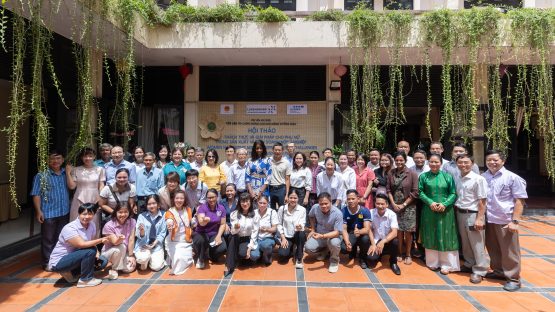From Da Nang Tourism Journal December 2023.
The continuous expansion of tourism has turned businesses in this industry—restaurants, hotels, and more—into pivotal consumers of diverse, high-potential products in today’s supply market. Each business has its own criteria, standards, and methods for procurement, with gender-responsive procurement emerging as a sustainable choice for brand development, closely linked to social responsibility, women’s empowerment, and the United Nations’ sustainable development goals.
According to Ms. Nguyen Kim Lan, Program Manager of Women’s Economic Empowerment at UN Women Vietnam, gender-responsive procurement includes purchasing from gender-responsive suppliers and prioritizing businesses owned by women. It also involves sharing information and providing skill training to empower these businesses to become professional suppliers of goods and services.

Currently, only a few major tourism corporations are leading the way in sustainable development, with a strong focus on gender equality and gender-responsive procurement. These corporations implement policies and practices that support women-owned suppliers. Approximately 60% of small and microenterprises in the Asia-Pacific region are owned by women. In Vietnam, about 22% of small and medium-sized enterprises (equivalent to nearly 100,000 businesses) are women-owned, and over half of the more than 5 million individual businesses are owned and managed by women. These businesses actively participate and serve as essential links in local supply chains. Consequently, diversified procurement policies by tourism businesses can attract a broader range of female suppliers, enhancing the sustainability of the supply network.
A UN Women survey conducted in 2022 with 350 organizations and businesses in the Asia-Pacific region revealed that more than 70% of businesses reported increased supply sources, improved supplier competitiveness, reduced supply chain disruption, and an average of 20% cost savings due to gender-responsive procurement. Additionally, 74% stated that responsible procurement enhanced their company’s brand and reputation, while 70% used gender-responsive procurement to boost innovation, agility, and creativity. Moreover, 76% agreed that gender-responsive procurement increased employee satisfaction and talent retention.
According to Boston Consulting Group (BCG), the “women’s market” is the most important business opportunity of our era. Women control around $20 trillion in annual spending, and by 2028, they are expected to influence 75% of global consumer spending, making them highly loyal customers. Businesses practicing gender-responsive procurement are more likely to attract, impress, and gain greater support from female customers. Furthermore, businesses that adopt gender-responsive procurement set themselves apart and add intangible value to their brands, enhancing their image in the eyes of employees and, in turn, increasing their dedication to the business.
On October 18th, UN Women, in collaboration with Songhan Incubator and the Women’s Initiative for Startups and Entrepreneurship (WISE), organized a panel discussion on “Sustainable Business Development Trends” in Da Nang. Representatives from restaurants, hotels, and tourism organizations in Da Nang and Hoi An participated. The program aimed to educate and raise awareness among staff responsible for procurement at local hotels and resorts, while guiding them to connect with suitable supply chain businesses in line with sustainable procurement trends.

Ms. Tu Thu Hien, Director of WISE, highlighted that people often assume there is no gender distinction in purchasing, but this overlooks the “gender lens,” which has unintentionally made it more challenging for women to access, develop markets, and sell products. She pointed out that many businesses are left behind due to the absence of necessary policies and legal frameworks to promote gender-responsive procurement. “We are ready to support restaurants, hotels, and tourism businesses in finding new suppliers and selecting products suited for the tourism industry, creating optimal opportunities for both buyers and sellers to connect,” Ms. Hien emphasized.

Ms. Xuan Nha, Procurement Manager of Four Points by Sheraton Da Nang (a hotel managed by Marriott International), shared that since 2021, the hotel chain has been diversifying its supplier base. “Marriott International has focused on increasing its procurement budget for businesses owned by women, LGBT individuals, people with disabilities, and minorities—referred to as diverse ownership.” Ms. Nha added, “According to Marriott International’s purchasing regulations, if a hotel’s procurement exceeds $50,000, it is mandatory to seek suppliers that meet diversity criteria, such as women-owned or LGBT-owned businesses. If not, an explanation must be provided to the corporation, following the competitive bidding process to ensure quality and competitive pricing.”

Mr. Dao Nguyen Tan, a representative from Wyndham Danang Golden Bay Hotel, noted that women-owned businesses face more difficulties compared to men in accessing customer partnerships. However, based on the hotel’s procurement experience, once collaboration is established, women-owned businesses tend to deliver more meticulous customer care and higher-quality cooperation.
Mr. Ly Dinh Quan, Director of Songhan Incubator, believes that the tourism industry holds tremendous potential for growth and can serve as a breakthrough for both the economy and society. He emphasized that the goal of increasing profits and business development must always go hand in hand with environmental and social responsibility, striving for human equality. At the same time, supplier businesses must continuously innovate and be creative to improve product quality and enhance competitive value, meeting the rigorous standards and demands of hotels and resorts. He stressed the importance of fostering connection and understanding between buyers, sellers, and intermediary support entities to find solutions that benefit all parties.

Echoing this sentiment, Ms. Xuan Nha expressed her hope that increased collaboration and the sharing of procurement challenges, as well as specific purchasing criteria by hotels and resorts, would empower small and medium-sized enterprises to refine their processes, improve designs, and enhance quality. This, in turn, would allow them to meet and access these standards, helping to strengthen their business commitments.



